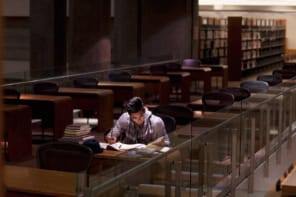David Roberts, a co-founder of 110th Street Films, is a writer and filmmaker. Previously he worked as a US diplomat

What sparked your initial interest in physics?
I never thought I’d become a physicist, but a seed was planted when I happened to pick up Stephen Hawking’s A Brief History of Time to kill time on my long drive to college. During that maiden 17-hour ride from my home in Alabama to university in New York, I don’t think I really understood anything of Hawking’s book, but the weirdness of time slowing down, and the black-hole paradoxes stuck with me. Then, soon after I arrived on campus, an older grad student turned me onto the Feynman Lectures. Because of Richard Feynman, I suddenly cared how electrons worked, and even more, how maths could explain it. Looking back, though, a more mundane impulse that led me towards a physics degree was the challenge of pursuing, from what I understood, the most difficult degree on campus. I wanted to see if I could hack it.
What did your physics degrees and following research focus on?
My physics background includes BS and MEng degrees from Cornell University, US, and a DPhil from the University of Oxford, UK, as a Marshall Scholar. My DPhil was focused on the theoretical aspects of quantum fluids. My academic career continued at the École normale supérieure in France, Princeton University, US, and Los Alamos National Laboratory, before I joined the US State Department. I continued working on quantum fluids after my degree, but was also fortunate to work with some smart folks on various interesting topics including genetics, geophysics and astrophysics. All of it was theoretical work with almost no immediate practical applications. I realize now how lucky I was to actually get paid to work on these cool puzzles.
Did you ever consider a permanent academic career, and how did your interest in politics and policy emerge?
I quickly fell for physics research as an undergraduate and fully expected to continue with research as a permanent academic career. As a physicist, I lived and worked in various countries from the UK and France to South Africa and Chile, and I had collaborators from all around the world. As I discovered new places, I became more interested in how the world worked in geopolitical terms rather than at the atomic level.
What was it like working as the US ambassador’s science adviser in Tokyo after the Fukushima crisis, and how did you get this role?
In 2010–2011 I was at the US State Department working on the contentious transboundary water issues in the Nile basin, with the idea that I would return to research in a year. Then the nuclear disaster happened at Fukushima, and I was asked on short notice to go to Tokyo to be the ambassador’s science adviser for a year, to assist the embassy with the recovery. I realized that that would probably be the end of my academic career, but I couldn’t pass up the opportunity. It was a steep learning curve as I knew little about nuclear reactors and even less about risk communication, all the while operating in an alien culture. My physics background proved valuable not only for technical aspects of the job but also in establishing relationships with my Japanese counterparts.
You’re now the co-founder of 110th Street Films. How did that come about and what does the company do?
During my time as a diplomat, I began writing articles in the New York Times, Wall Street Journal, Atlantic, etc and one of my articles sparked interest in a documentary adaptation. Although it did not pan out, I began to shift my focus from writing and international relations to my first love – film. After a few years filled with some twists and turns, I co-founded the production company 110th Street Films, with Billy Shebar – someone who actually knows how to make great films – and we are working on various film projects with some of my heroes. How did I go from thinking about Bose–Einstein condensates to creating satirical Trump animations? I really don’t have a clue.
How has your physics background been helpful in your work, if at all?
Whenever I worry that I don’t know what I am doing, I say to myself “How hard can this be? It’s not quantum field theory.” Actually, the human element of diplomacy and making a film is probably just as complex as the trickiest physics problems, but my physics background has given me confidence in approaching new problems, and that has been one the biggest assets in my career.
Any advice for today’s students?
Take some risks and don’t be afraid of getting off the path.
- You can follow David Roberts on Twitter at @DRobertsNYC; 110thstreet.com



